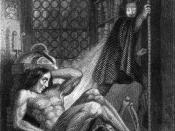Frankenstein by Mary Shelley
From the Age of Enlightenment arose the belief that reason was the answer to all of mankind's problems. Recent breakthroughs in the sciences not only allowed for a greater understanding of the world, but more importantly, instilled the belief that no feat was out of reach. Mathematics provided man with certain knowledge. Structured, rational thought overcame the injustice of superstition and bigotry and revealed truth. This mind-set reigned supreme throughout the eighteenth century. However, in 1818 when Mary Shelley published her renowned first novel, a new way of thought known as Romanticism had emerged to challenge it. This movement shied away from a fixation on reason and the pursuit of knowledge. Instead, it focused on mankind in his primal nature, stressing the value of emotion, the spirit, and the potential to flourish by staying true to the natural order of man and his relationship to the universe and himself.
In her imaginative novel Frankenstein, Mary Shelley champions nature and the natural. The first character and the novel's protagonist, Victor Frankenstein, initially harbors an innocent interest in science, but this interest soon develops into an obsession with conquering life's mysteries. He recounts this effort to Robert Walton, a sea captain and explorer who, like Victor, tries to surpass nature's limitations in the pursuit of knowledge. Through Victor's account and the effect it has on Robert, Shelley reaches several conclusions, all bearing evidence to Romanticism's influence.
Shelley discloses the theme of her book when, towards the beginning of his tale, Victor advises Robert: "Learn from me, if not by my precepts, at least by my example, how dangerous is the acquirement of knowledge and how much happier that man is who believes his native town to be the world, than he who aspires to become greater than...


